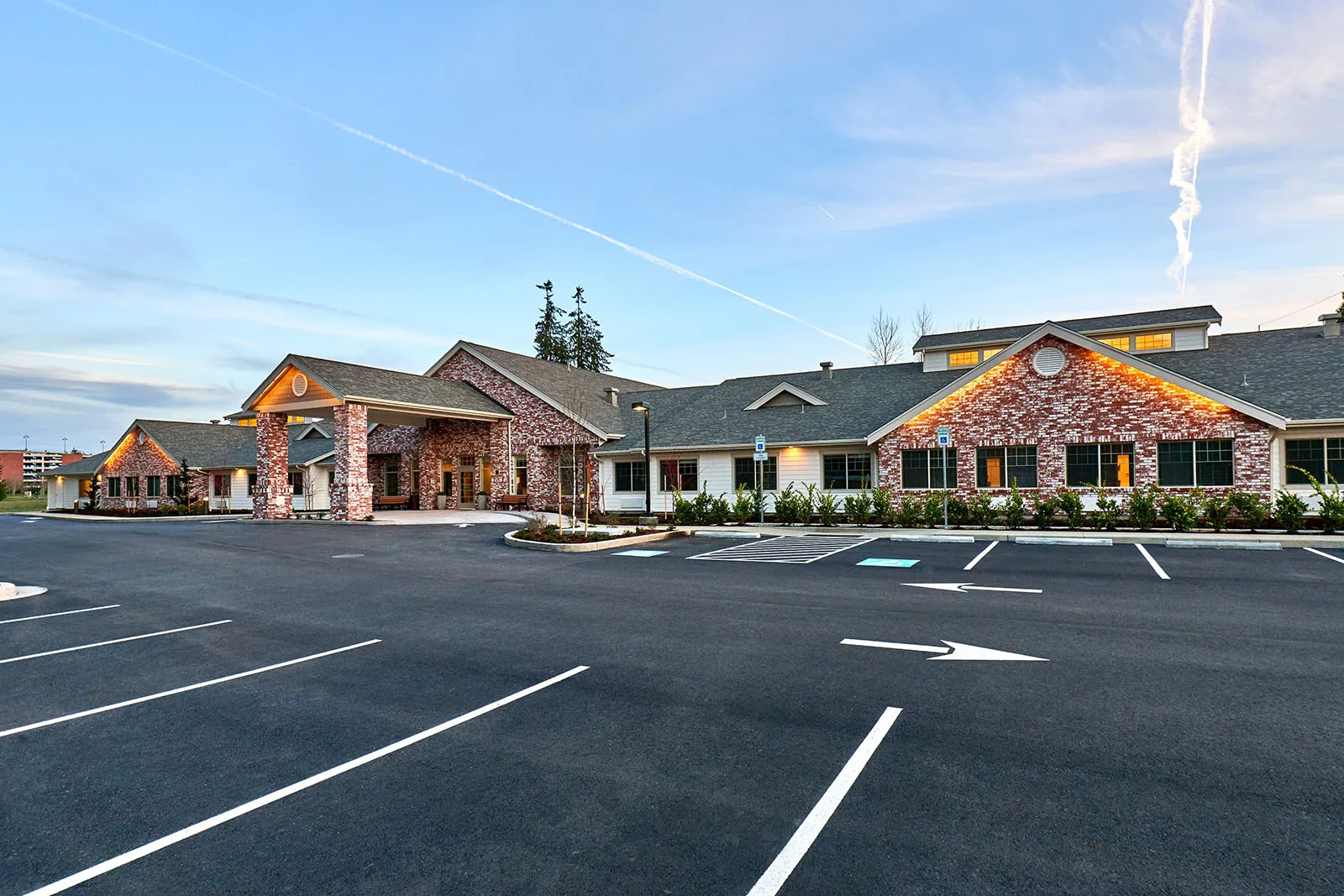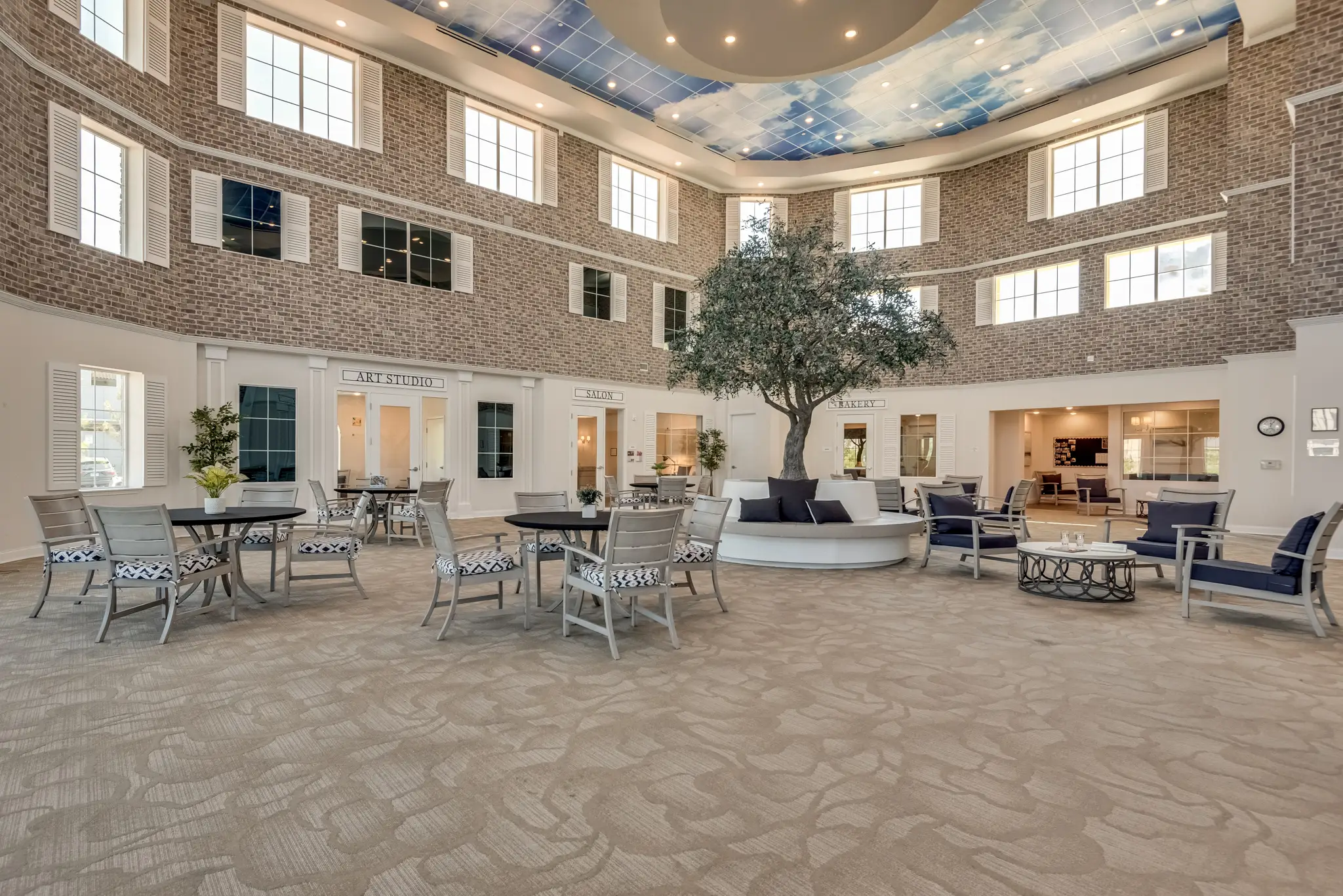Cost Comparison of Memory Care vs. 24-hour Home Care

As our beloved ones enter their senior years, their well-being becomes critical, and ensuring they receive all the care and support they need to live their remaining years to the fullest is the main concern. It's all about helping them find fulfillment and joy during this stage of life, and that's something we truly understand and empathize with. For those with Alzheimer's or dementia, memory care is often necessary to provide specialized care and support. But what is memory care, and how does it compare to 24-hour home care? In this blog post, we'll explore the cost comparison of memory care vs. 24-hour home care for ONELIFE Senior Living, a provider of residential communities designed to support seniors in their legacy years.
What is Memory Care?
Memory care is a specialized type of senior living that focuses on providing dedicated support and care services to seniors affected by Alzheimer's disease or other types of dementia. Memory care communities are designed to provide a safe and secure environment for seniors with memory impairments, with staff trained in specialized care techniques to support residents' unique needs. Memory care communities often provide a range of services, including medication management, assistance with daily living activities, and specialized programming and activities to support cognitive function.
Cost Comparison: Memory Care vs. 24-hour Home Care
When it comes to the cost of memory care vs. 24-hour home care, there are several factors to consider. While 24-hour home care may seem like a more cost-effective option at first glance, there are several hidden costs that can quickly add up. These include:
- Home modifications: Depending on the level of care required, home modifications may be necessary to ensure the safety and comfort of the senior. This can include installing grab bars, wheelchair ramps, or other accessibility features.
- Caregiver wages: Hiring a caregiver to provide 24-hour care can be expensive, with hourly rates ranging from $15-$30 per hour on average. This can quickly add up to thousands of dollars per month.
- Hidden costs: There may be additional costs associated with 24-hour home care, such as transportation to medical appointments, meal preparation, or housekeeping services.
In comparison, memory care communities like ONELIFE Senior Living provide a range of services and amenities as part of their monthly fee. This can include:
- 24-hour care and support from trained staff
- Medication management
- Assistance with daily living activities
- Specialized programming and activities
- Meals and snacks
- Housekeeping and laundry services
- Transportation to medical appointments
While the cost of memory care may initially seem higher than 24-hour home care, it's important to consider the value of the services provided. Memory care communities provide a safe and supportive environment designed to meet the unique needs of seniors with memory impairments, with staff trained in specialized care techniques. This can bring comfort to families, offering reassurance that their loved ones are receiving the necessary care and support to lead fulfilling and contented lives.
ONELIFE Senior Living Memory Care Communities
ONELIFE Senior Living operates five memory care communities across the United States, including:
Each of these communities is designed to provide specialized care and support to seniors with memory impairments, with staff trained in the latest care techniques and programming designed to support cognitive function.
In addition to memory care, ONELIFE Senior Living also operates assisted living communities, including The Esther at Riverbend Assisted Living in Springfield, OR, and Middlefield Oaks Senior Living in Cottage Grove, OR. These communities provide a range of services and amenities designed to support seniors with a variety of needs and preferences.
Cost Comparison: ONELIFE Senior Living Memory Care vs. 24-hour Home Care
To better understand the cost comparison between ONELIFE Senior Living memory care communities and 24-hour home care, let's take a closer look at the costs associated with each option.
Memory Care Costs:
The cost of memory care at ONELIFE Senior Living varies depending on the community and the level of care required. In general, memory care at ONELIFE Senior Living ranges from $3,500-$7,000 per month, with additional fees for additional services or amenities. While this may seem like a significant expense, it's important to consider the value of the services provided. Memory care communities like ONELIFE Senior Living provide a safe and supportive environment designed to meet the unique needs of seniors with memory impairments, with staff trained in specialized care techniques.
24-hour Home Care Costs:
The cost of 24-hour home care can vary widely depending on the level of care required and the location of the senior. The cost of round-the-clock home care typically ranges from $15 to $30 per hour, with supplementary charges for services such as transportation, meal preparation, or housekeeping. For seniors in need of constant care and support, the expenses associated with 24-hour home care can swiftly accumulate to several thousand dollars per month.
When comparing the cost of memory care vs. 24-hour home care, it's critical to consider the value of the services being provided. Memory care communities like ONELIFE Senior Living provide a range of services and amenities as part of their monthly fee, designed to meet the unique needs of seniors with memory impairments. In contrast, the cost of 24-hour home care can quickly add up due to hidden costs like home modifications and additional services.
Activities for Memory Care Communities
In addition to specialized care and support, memory care communities like ONELIFE Senior Living provide a range of activities and programming designed to support cognitive function and promote socialization. Engaging in these activities significantly contributes to the overall improvement of residents' well-being. Some examples of activities commonly found in memory care communities include:
- Arts and Crafts: Engaging in creative activities like painting, drawing, and pottery can help stimulate cognitive function and provide a sense of accomplishment for residents.
- Music Therapy: By listening to or simply participating in music therapy sessions can have a positive impact on memory, mood, and emotional well-being.
- Exercise Programs: Physical activity is essential for overall health. Memory care communities often offer exercise programs tailored to seniors' needs, promoting mobility and strength.
- Gardening: Participating in gardening activities can provide a sense of purpose and fulfillment while fostering a connection with nature.
- Pet Therapy: Interacting with therapy animals can bring comfort and joy to residents, reducing stress and promoting emotional well-being.
- Games and Puzzles: Engaging in games and puzzles can help stimulate cognitive function and improve memory and problem-solving skills.
- Religious Services: Memory care communities often provide spiritual support by organizing religious services or facilitating visits from religious leaders.
- Social Events and Outings: Organizing social events and outings allows residents to interact with their peers, fostering social connections and reducing feelings of isolation.
By providing a range of activities and programming, memory care communities can help seniors with memory impairments stay engaged and active, promoting overall health and well-being.
Assisted Living Costs
Assisted living is another form of senior living that provides support and care services to seniors who may need assistance with daily living activities but do not require the specialized care provided by memory care communities. The expenses associated with assisted living can vary significantly based on factors such as the geographical area and the level of care needed. On average, the monthly costs of assisted living can range between $3,000 to $5,000. It's important to note that additional fees may apply for supplementary services and amenities beyond the standard care package.
Veterans Independent Living
For veterans and their spouses, there may be additional resources available to help with the cost of senior living. The VA Aid and Attendance Pension Benefit provides financial assistance to veterans and their spouses who require assistance with daily living activities, including memory care and assisted living. In order for the veterans to be eligible for the benefit, they must have completed a minimum of 90 days of active duty, with at least one day served during a period of war. The VA Aid and Attendance Pension Benefit offers financial assistance to qualified veterans and their spouses who require support with daily living activities, including memory care and assisted living. Benefits grant a monthly allowance of up to $1,936 for individual veterans, up to $2,295 for married veterans, and up to $1,244 for surviving spouses.
When it comes to the cost comparison of memory care versus 24-hour home care, it's important to consider the value of the services provided. 24-hour home care might seem like the more cost-effective option at first; however, there are several hidden costs that can quickly add up and remove any cost-effectiveness from that solution. Memory care communities like ONELIFE Senior Living provide a range of services and amenities as part of their monthly fee, designed to meet the unique needs of seniors with memory impairments.
By choosing memory care at ONELIFE Senior Living, families can rest assured that their loved ones are receiving high-quality care and support in a safe and secure environment. The dedicated staff and specialized programming offered by memory care communities contribute to the overall well-being and quality of life of residents.
It's important to consider the individual needs of your loved one when making decisions about senior care, their safety, and the overall quality of life they will experience. ONELIFE Senior Living is committed to providing exceptional memory care services tailored to the unique needs of seniors with Alzheimer's disease or dementia.
Cost Comparison of Memory Care vs. 24-hour Home Care
As our loved ones enter their legacy years, ensuring their well-being and quality of life becomes a top priority. For individuals dealing with Alzheimer's disease or other forms of dementia, specialized care is often required. In such cases, families are faced with choosing between memory care communities and 24-hour home care. Each option has benefits and costs, and understanding the differences can help families make an informed decision. In this article, we will explore the cost comparison of memory care versus 24-hour home care, with a focus on ONELIFE's memory care communities.
Memory Care at ONELIFE Senior Living
ONELIFE Senior Living is dedicated to providing exceptional care and support for seniors in their legacy years. With a focus on memory care, they have five communities tailored specifically for individuals with Alzheimer's disease or dementia. These communities include Battle Creek in Salem, OR; Shadow Mountain in Phoenix, AZ; The Rawlin in Springfield, OR; Waterhouse Ridge in Beaverton, OR; and Middlefield Oaks in Cottage Grove, OR. In addition to memory care, ONELIFE also offers assisted living services at The Esther in Springfield, OR, and Middlefield Oaks in Cottage Grove, OR.
Understanding Memory Care
Memory care is a specialized form of senior care designed to meet the unique needs of individuals with memory-related conditions. These communities provide a safe, secure environment that promotes independence while offering personalized assistance and support. Memory care communities like ONELIFE focus on creating a structured and nurturing environment that enhances the quality of life for residents with Alzheimer's disease or dementia.
The Cost of Memory Care
When considering the cost of memory care, it's important to note that prices can vary based on several factors, including location, amenities, and the level of care required. ONELIFE Senior Living offers competitive pricing for its memory care communities, taking into account the quality of care, services provided, and the specialized nature of its facilities. While specific pricing details can be obtained directly from ONELIFE, it's essential to understand the factors that contribute to the overall cost.
- Accommodation: Memory care communities typically offer private or shared rooms, and the cost will vary depending on the type of accommodation chosen. Private rooms generally come at a higher price due to the increased privacy and personal space they offer.
- Amenities and Services: Memory care communities provide a range of amenities and services to enhance residents' quality of life. These may include 24-hour supervision, assistance with activities of daily living (ADLs), medication management, housekeeping, laundry services, and specialized programming tailored to memory care needs. The cost of these amenities and services is typically included in the overall pricing.
- Staffing and Caregivers: Memory care communities employ trained and compassionate staff who are experienced in caring for individuals with Alzheimer's disease or dementia. The cost of staffing and caregivers is factored into the pricing structure to ensure residents receive the necessary care and attention.
- Medical Support: Memory care communities often have medical professionals on staff or on call to provide healthcare services and oversee residents' medical needs. This includes medication administration, coordination of medical appointments, and monitoring of health conditions.
Cost Comparison: Memory Care vs. 24-hour Home Care
While memory care communities provide a comprehensive and specialized approach to caring for individuals with Alzheimer's disease or dementia, some families may consider 24-hour home care as an alternative option. Let's explore the cost comparison between these two choices.
- Memory Care: The cost of memory care varies depending on the factors mentioned above, including location and level of care required. ONELIFE Senior Living strives to offer competitive pricing while ensuring the highest quality of care and services for residents. While memory care can be more expensive than some other forms of senior care, it provides a secure and stimulating environment tailored to the unique needs of individuals with memory-related conditions.
- 24-hour Home Care: Opting for 24-hour home care involves hiring professional caregivers who provide round-the-clock assistance in the comfort of the individual's home. The cost of 24-hour home care depends on factors such as the number of hours needed, the level of care required, and the region's average rates. It's important to consider that the cost of home care can increase significantly if additional medical support, specialized equipment, or modifications to the home are necessary.
It is worth noting that memory care communities like those provided by ONELIFE offer numerous benefits that may not be fully attainable with 24-hour home care. Memory care communities are designed specifically to cater to the needs of individuals with Alzheimer's disease or dementia. They offer a secure environment with structured routines, specialized programming, and trained staff who understand the challenges associated with memory-related conditions. These communities also provide socialization opportunities and activities specifically tailored to engage residents and promote cognitive function.
Making the Right Choice
When deciding between memory care and 24-hour home care, it's crucial to consider the needs of the individual that requires the care services, safety, and the overall quality of life. Memory care communities like those offered by ONELIFE Senior Living are specifically designed to provide the highest level of care and support for individuals with Alzheimer's disease or dementia. The cost of memory care reflects the specialized nature of these communities and the comprehensive services they provide.
It's recommended to contact the ONELIFE team directly to determine the exact cost of memory care in their communities. They can provide detailed information about pricing, availability, and the specific services included. By understanding the cost comparison between memory care and 24-hour home care, families can make an informed decision that ensures their loved ones receive the care they deserve.
Take the first step towards providing exceptional memory care for your loved one by contacting ONELIFE Senior Living today. Visit https://www.onelifeseniorliving.com/ to learn more about their memory care communities and request additional information. With their expertise and commitment to excellence, ONELIFE is ready to provide the care, support, and encouragement needed for seniors to live healthy, happy lives.
Explore ONELIFE Communities Across the Country
ONELIFE Senior Living is proud to serve families in multiple regions, offering exceptional care and support tailored to each resident’s needs. In Springfield, Oregon, The Esther at Riverbend Assisted Living provides personalized assisted living services, while The Rawlin at Riverbend Memory Care specializes in compassionate Alzheimer’s and dementia care. Families in Salem can find trusted support at Battle Creek Memory Care, and those in Beaverton benefit from the warm, secure environment at Waterhouse Ridge Memory Care.
For families in Nevada, Vineyard Henderson Memory Care offers expert dementia care in the heart of Henderson, while in California, The Reserve at Fountaingrove Memory Care provides high-quality memory support in Santa Rosa, and The Woodlake Senior Living serves Sacramento with a full spectrum of senior living options. In Cottage Grove, Oregon, Middlefield Oaks Senior Living combines independence and care, while in the Midwest, The Laurel at Vernon Hills Memory Care stands as a dedicated resource for families in Vernon Hills, Illinois. Finally, in Phoenix, Arizona, Shadow Mountain Memory Care delivers compassionate, all-inclusive memory care in a safe and engaging setting.
No matter which location you choose, every ONELIFE community is united by the same mission: providing exceptional care, meaningful activities, and a true sense of family for residents and loved ones.
FAQ: Cost Comparison — Memory Care vs. 24-Hour Home Care
Is 24-hour home care more expensive than memory care?
Often yes. 24/7 home care usually requires multiple caregivers and agency fees, which can exceed a community’s bundled monthly rate that includes housing, meals, activities, and staffing.
How much does 24-hour home care cost per month?
Multiply your local hourly rate by 24 hours, then by 30 days (and include nights/weekends and agency markups). For example, at $28/hour, continuous care can exceed $20,000/month before supplies or transportation.
What is the average monthly cost of memory care?
Rates vary by market and care level, but many communities provide a base rent (housing, meals, activities) plus a tiered care fee. Ask for a written estimate that separates base rent, care level, and any add-ons.
What’s included in memory care that I’d have to pay for at home?
24/7 supervision, secure environment, life-enrichment programming, meals, housekeeping, laundry, medication management, and care coordination are usually bundled into the community rate.
Does Medicare pay for memory care or 24-hour home care?
Medicare does not cover room and board in memory care and generally doesn’t pay for non-skilled 24/7 home care. It may cover medical services (e.g., rehab, physician visits). Check your specific plan details.
Can Medicaid help with memory care or in-home dementia care?
Coverage depends on your state and eligibility. Some states offer waiver programs that offset memory-care services or in-home support. Contact your local aging services office or the community for guidance.
Are memory care costs tax-deductible?
Portions of long-term care may qualify as medical expenses if a physician certifies the resident is chronically ill and services are part of a care plan. Consult a tax professional for your situation.
Do VA benefits help pay for memory care or home care?
Veterans and surviving spouses may qualify for benefits that can offset costs (e.g., Aid & Attendance). Ask the community for a VA benefits checklist or contact a VA-accredited advisor.
What hidden costs should we plan for at home?
Night coverage, overtime, backup caregivers, incontinence supplies, home modifications, transportation, and care coordination time can add up quickly beyond the base hourly rate.
How do I estimate my family’s monthly cost?
For home care: total daily hours × local hourly rate × 30, plus supplies and transport.
For memory care: base rent + care level fee + any extras (e.g., salon, cable). Request a line-item quote from each provider.
Memory Care in Phoenix, Salem, Springfield, Beaverton, Cottage Grove, San Jose, Vernon Hills and Henderson
Choosing the right memory care facility for your loved one is a crucial decision. By understanding what memory care entails and considering the factors that make a great memory care community, you can ensure your loved one receives the best possible care. At ONELIFE Senior Living, we are here to support you every step of the way.
ONELIFE Senior Living offers exceptional memory care facilities in various locations throughout the country, including:
Phoenix, Arizona
Shadow Mountain Memory Care
Salem, Oregon
Battle Creek Memory Care
Springfield, Oregon
The Rawlin at Riverbend Memory Care
Beaverton, Oregon
Waterhouse Ridge Memory Care
Cottage Grove, Oregon
Middlefield Oaks Senior Living
San Jose, California
Sonnet Hill Senior Living
Vernon Hills, Illinois
The Laurel at Vernon Hills Memory Care
Henderson, Nevada
Vineyard Henderson Memory Care
Our communities are dedicated to providing a supportive and enriching environment for residents with memory loss. With personalized care plans, engaging activities, and compassionate staff, we strive to make our memory care communities a place where residents feel at home. Contact us today to learn more about our memory care facilities, and let us help you find the perfect home for your loved one.
Contact us
learn more about our
community

More Articles & Resources
EXPLORE THE ONELIFE COMMUNITIES




















